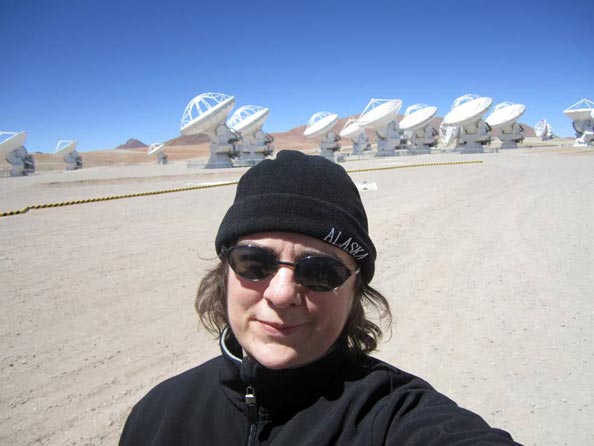
Tracy visited the Atacama Large Millimeter/sub-millimeter Array (ALMA) as an external reviewer during 2012. The site is located in the Atacama desert of northern Chile at an altitude of 5058 meters (16597 ft). Walking around the site was an interesting challenge in itself! The array is nearing completion and will be the most powerful instrument ever built to study star formation in the early Universe as well as planet formation in nearby solar systems.
Dr. Tracy Clarke is a Research Astronomer in the Remote Sensing Division at the Naval Research Laboratory in Washington, D.C. She served as and the System Scientist for the Long Wavelength Array and is the Project Scientist for Astronomy for a new $1.1M VLA Ionospheric and Transient Experiment being deployed on the National Radio Astronomy Observatory's Very Large Array. Tracy attended the University of New Brunswick (Fredericton campus) where she received a B.Sc. (Honours) in Physics in 1993. She then went on to graduate studies at the University of Toronto, receiving an M.Sc. in Astronomy in 1994. She continued her graduate work at the University of Toronto and, with support from O'Brien Foundation funding (1998), she completed her Ph.D. in Astronomy in 1999.
Following graduation, Dr. Clarke was awarded a prestigious Jansky Postdoctoral Fellowship at the National Radio Astronomy Observatory in Socorro, New Mexico. During her three year tenure, Dr. Clarke took advantage of new instrumentation on the NRAO VLA telescope to explore the Universe at low radio frequencies. She then accepted a postdoctoral position in the X-ray astronomy research group at the University of Virginia where she concentrated on combining data from NASA X-ray satellites with data from the NRAO VLA. Dr. Clarke then moved to the Remote Sensing Division at the Naval Research Laboratory where she continues to analyze astronomical observations she obtains from telescopes across the the world and has also worked in the field to build new radio antennas which have been deployed within numerous states in the USA as well as several other counties. Dr. Clarke has a number of press releases based on her research and instrument work and is author or co-author on 56 peer-reviewed publications.

